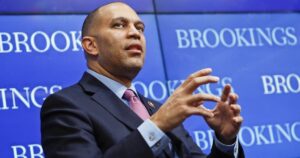State Department Formally Shutters USAID Operations
The State Department announced Friday the closure of the U.S. Agency for International Development (USAID) after a federal court decision supported cost-cutting measures pushed by the Trump administration.
This development follows a major victory for the former administration in a federal court case. The decision enabled the Department of Government Efficiency (DOGE), under the leadership of Elon Musk, to proceed with significant budget cuts.
The move, first pushed by Republican lawmakers critical of the agency, is aimed at restructuring U.S. foreign assistance.
USAID's Functions to Move to State Department by July 1
With an annual budget of around $40 billion, USAID has played a key role in global health and foreign aid initiatives over the years. These initiatives have spanned crucial areas like healthcare support, economic development, and crisis response worldwide.
However, according to critics in Congress, funding controversial projects, such as a transgender opera in Colombia and electric taxis in Vietnam, diverted focus from core goals.
Republican officials were keen on reshaping these expenditures to prioritize domestic interests. The activities of USAID were at the center of a dispute that reached the federal appeals court. At issue was whether the administration's restructuring plans for foreign aid were constitutional.
The federal court's decision dismissed a restraining order against DOGE's termination efforts. The panel, consisting of Circuit Judges Paul Niemeyer and Marvin Quattlebaum, Jr., ruled against allegations that Elon Musk’s initiatives were unconstitutional.
Judge Roger Gregory expressed reservations about the broader implications, yet he aligned with the ruling based on the court’s limited scope of consideration.
Plan to Retain Key USAID Functions
The State Department plans to recruit some USAID employees to continue essential aid programs moving forward. In a memo circulated to Congress, Secretary of State Marco Rubio underscored the importance of realigning foreign assistance efforts with U.S. national interests.
“Foreign assistance done right can promote our national interests,” Rubio noted. He stressed that USAID had drifted from its fundamental purpose, resulting in diminished benefits and exorbitant costs. With USAID functions transitioning to the State Department, the goal will be greater efficiency and accountability, focusing foreign aid on strategic objectives.
Rubio lauded the efforts to streamline foreign aid management, crediting President Trump for ending what he described as a 'misguided and fiscally irresponsible era.' The challenge, he conveyed, lies in refining foreign aid to serve citizens' interests effectively. This endeavor is expected to foster stronger alliances with key global partners.
Impact and Controversy Surrounding Foreign Aid Changes
There remains concern about the potential long-term impact of halting congressionally approved foreign aid projects. “We may never know the full extent of lives affected by these actions,” Judge Gregory warned, though this was beyond the remit of the court's ruling.
The abrupt nature of these changes has sparked debate among foreign policy experts and humanitarian advocates. They highlight the necessity of maintaining support for life-saving initiatives in developing countries.
The discourse has centered on balancing fiscal responsibility with humanitarian commitments.
Nevertheless, the focus has shifted to a strategic approach. “Intends to assume responsibility” for crucial USAID roles, former DOGE official Jeremy Lewin conveyed to ABC News. This statement reflects the State Department’s intent to balance strategic aid programming with national priorities.




